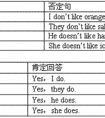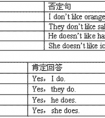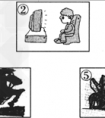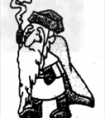根据首字母和句意将句子补充完整。1. Anelephant'snoseisl____________ thanacat's.2. T____________rightatthefirstcrossingandyoucanfinditonyourright.3. Whatare-六年级英语
职业
teacher student doctor nurse driver farmer singer writer actor actress artist TV reporter engineer
accountant policeman salesperson cleaner baseball player assistant policeman
颜色
red blue yellow green white black pink purple orange brown]
食品
rice bread beef milk water egg fish tofu cake hot dog hamburger noodles meat
chicken pork mutton vegetable soup ice-cream Coke juice tea coffee (breakfast lunch dinner)
水果,蔬菜
apple banana pear orange watermelon grape eggplant green beans tomato potato peach cucumber strawberry onion carrot cabbage
衣服
jacket shirt T-shirt skirt dress jeans pants socks shoes sweater coat shorts sneakers slippers sandals boots hat
交通工具
bike bus train boat ship car taxi yacht taxi jeep van plane subway motor cycle
杂物
window door desk chair computer board fan light teacher's desk picture wall floor curtain trash bin closet mirror end table
football present lamp phone sofa shelf fridge table air-conditioner photo plate knife fork spoon ball kite box violin e-card e-mail traffic light money medicine
地点
home room bedroom bathroom living room kitchen classroom school park library post office hospital cinema bookstore
farm zoo garden study playground canteen teacher's office gym washroom art room company factory fruit stand pet shop nature park theme park bank village city
国家
China/PRC America/USA England Canada/CAN
天气
cold warm cool snowy sunny hot rainy windy cloudy weather reporter
景物
river lake stream forest path raod house bridge building rain cloud sun mountain sky
植物
flower grass tree seed sprout plant leaf
星期
day Monday Tuesday Wednesday Thursday Friday Saturday Sunday weekend
月份
month January February March April May June July August September October November December year
季节
spring summer fall(autumn) winter
方位
south north east west left right
患病
have a fever hurt have a cold have toothache have a headache have a sore throat
数词
One two three four five six seven eight nine ten eleven twelve thirteen fourteen fifteen sixteen seventeen eighteen nineteen
twenty thirty forty fifty sixty seventy eighty ninety first second third fourth fifth eighth ninth twelfth twentieth
形容词
big small long tall short young old strong thin active quiet nice kind strict smart funny tasty sweet salty sour fresh favourite
clean tired excited angry happy bored sad fine great heavy new fat happy right little lovely beautiful colourful pretty cheap expensive sick better
介词
in on under near behind next to over in front to from to for
代词
I me my we us our you your he him his she her it its they them their
动词
Play swim skate fly jump walk run climb fight swing eat like have turn buy take live teach go study learn sing dance row do homework watch TV read books cook the meals water the flowers sweep the floor clean the bedroom make the bed set the table wash the clothes do the dishes use a computer do morning exercises eat breakfast eat dinner go to school have English class play sports get up climb mountains go shopping play the piano visit grandparents go hiking fly kites make a snowman plant trees draw pictures cook dinner read a book answer the phone listen to music clean the room write a letter write an e-mail drink water take pictures watch insects pick up leaves do an experiment catch butterflies count insects collect insect collect leaves write a report play chess have a picnic get to ride a bike play the violin make kites collect stamps meet welcome thank work look help pass show use clean open close stop wait drive send feel become think wear put on go home go to bed play computer games do housework empty the trash put away the clothes get off(on) take a trip go on a trip read a magazine go to the cinema
疑问词
what(什么) what colour(什么颜色) what time(几点)
what day(星期几) how(怎样)how old(年龄多大,几岁)
how many(多少) how much (多少钱) how tall (多高)
how heavy(多重) how long(多长) how big(多大) how large(面积多大) who(谁) when(什么时候)
whose (谁的) where(在哪里) why(为什么)
which(哪一个)
be动词
am is are was were
助动词:do does did
情态动词
can should would will
考点名称:一般将来时
一般将来时:
表示将来某个时间要发生的动作或存在的状态,也表示将来经常或反复发生的动作。
由“助动词will+动词原形”构成。“be going to+动词原形”结构是将来时的另一种形式,表示将要发生的事或者事先经过考虑打算去做某事。
例:We will go to Shanghai next year. 明年我们要去上海。
We are going to have a football match tomorrow. 我们明天要举行一场足球比赛。
Tom is going to have a bath. 汤姆要去洗澡了。一般将来时常见结构:
1、will / shall + 动词原形(否定句在will/shall后加not)
will 常简略为 'll,并与主语连写在一起,如: I'll,she'll,he'll,it'll,we'll,you'll,they'll。
一般疑问句如用will you…?其简略答语须是Yes,I will或 No,I won't;如用 Shall I…?(较少见)其简略答语须是 Yes,I shall.或 No, I shall not.
这种方法一般单纯地表示将来某个时间将要发生的动作或存在的状态。will用于各种人称;shall只用于第一人称。 例如 :
I will / shall go to visit him next week. 下周我将去拜访他。
What time shall we go there tomorrow? 明天我们几点去那儿?
2、be going to 动词原形
be going to 相当于一个助动词(其中be有人称和数的变化),与它后面的动词原形一起构成谓语。用来表示近期将要发生的动作以及计划、安排和打算要做的事。例如:
There is going to be a football match this afternoon.今天下午将有一场足球赛。
I‘m going to go to the park. 我将要去公园。
常用结构:
1、用于"I expect, I'm sure, I think, I wonder宾语从句"中。
Don't worry about the exam. I'm sure you'll pass.
不要担心这次考试,我确信你会通过的。
2、用于祈使句和陈述句中。
Work hard and you will succeed.
如果你努力,就会成功的。
3、与表示时间或条件的状语从句连用。
I'll let you know as soon as he arrives.
他一到我就通知你。- be going to与will的区别:
be going to与will两者都可表示将要发生的事、将要去做某事,但它们有如下几点区别:
1. be going to 表示近期、将要发生的事情,will 表示的将来的时间则较远一些,如:
He is going to write a letter tonight.
He will write a book one day.
2. be going to 表示根据主观判断将来肯定发生的事情,will表示客观上将来势必发生的事情。
He is seriously ill. He is going to die.
He will be twenty years old.
3. be going to 含有“计划,准备”的意思,而 will 则没有这个意思,如:
She is going to lend us her book.
He will be here in half an hour.
4.在有条件从句的主句中,一般不用 be going to, 而多用will, 如:
If any beasts comes at you, I'll stay with you and help you
注意
be going to和will在含义和用法上稍有不同。be going to往往表示事先经过考虑的打算;will多表示意愿,决心。两者有时不能互换。如:
She is studying hard and is going to try for the exams.她正努力学习并尝试参加考试。(is going to不能用will替换) - 一般将来时一般用法:
(1)一般将来时表示将要发生的动作或情况。
例如:I will(shall) arrive tomorrow.我明天到。(主语是第一人称时最好用shall)
Will you be free tonight? 你今晚有空吗?
We won’t (shan’t) be busy this evening. 我们今晚不忙。
(2)在一般将来时的句子中,有时有表示将来时间的状语,有时没有时间状语,这时要从意思上判断是否指未来的动作或情况。例如:
Will she come? 她(会)来吗?
(3)在以第一人称I或we作主语的问句中,一般使用助动词shall,这时或是征求对方的意见,或是询问一个情况(b):
- 最新内容
- 相关内容
- 网友推荐
- 图文推荐
| [家长教育] 孩子为什么会和父母感情疏离? (2019-07-14) |
| [教师分享] 给远方姐姐的一封信 (2018-11-07) |
| [教师分享] 伸缩门 (2018-11-07) |
| [教师分享] 回家乡 (2018-11-07) |
| [教师分享] 是风味也是人间 (2018-11-07) |
| [教师分享] 一句格言的启示 (2018-11-07) |
| [教师分享] 无规矩不成方圆 (2018-11-07) |
| [教师分享] 第十届全国教育名家论坛有感(二) (2018-11-07) |
| [教师分享] 贪玩的小狗 (2018-11-07) |
| [教师分享] 未命名文章 (2018-11-07) |



![Myuncleisforty, buthe ____________thanmyfather.[ ]A. lookyoungB. lookslikeyoungC. looksyoungerD. looksgettingyoung-六年级英语](http://www.00-edu.com/d/file/ks/4/1/30/2019-08-17/smallddb860e524a845aa74ac06d29a7422b81565981628.png)


